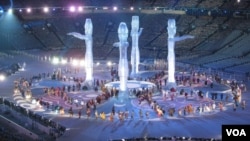An indigenous-led bid to host the 2030 Winter Olympic and Paralympic Games in Vancouver has hit a major roadblock. The British Columbia government has declined to support the bid, and in doing so has angered the First Nations by not meeting with them to discuss the project.
The bid for the Vancouver area to once again host the Winter Games is being led by what is called the Four Host First Nations. The Squamish, Musqueam, Tseil-Waututh and Lilwat have traditionally lived in the area now known as Vancouver and the ski resort of Whistler.
The area hosted the 2010 Winter Olympic and Paralympic Games and as part of that event, hundreds of First Nation youths from across Canada came together for what was known as "The Gathering." Since then, awareness of the rights of Indigenous peoples has increased, and hosting the Games has been promoted as a way to highlight Indigenous culture. It is also seen as an act of reconciliation in light of historic human rights abuses against First Nations.
Lisa Beare, the British Columbia Tourism and Sport Minister, declined to speak directly with VOA, but in a written release, she said the provincial government will not support the proposal because of potential direct costs and more financial risk in indemnifying any 2030 Games.
She has estimated the Games would cost just under $900 million U.S. dollars ($1.2 billion Canadian) with the province exposed to a further $730 million in risk ($1 billion Canadian). This is with most of the venues from the 2010 Games being reused.
Other factors in the decision not to financially back the bid include Vancouver being a host city for the 2026 Men's World Cup of Soccer and the 2025 Invictus Games.
Chief Jen Thomas of the Tseil-Waututh First Nation said the decision marks 10 steps back for the process of reconciliation. She said the organizers of the bid could live with the answer being no, but are upset that the provincial government did not make an effort to discuss the proposal with the First Nations, or the Canadian Paralympic and Olympic Committees.
"You know, we did invite the province to come to our table to talk about this," she said. "We were asked by the province to share why we want the Olympics, why it's so important to us, and we didn't even get that opportunity to share that with them."
Wilson Williams of the Squamish First Nation, said despite the provincial government's claims of reconciliation and working with U.N. Declaration on the Rights of Indigenous Peoples, the British Columbia provincial government is not truly ready.
"And you know, I know they're working with colonial system that keeps pushing Indigenous peoples away," Williams said. "But at the same time, like I said, we're not going away. We will stand strong in order to have our voice heard."
Along with the other First Nations and the Canadian Paralympic and Olympic Committees, Wilson said his people are still open to discussions with the provincial government on the project.
He noted that the First Nations are not involved in Vancouver being a host city for the 2026 World Cup or the Invictus Games.
In a written statement to VOA, a spokesperson for Lisa Beare, the tourism minister, said she offered to meet with the First Nations and is willing to do so. However, after evaluating the proposal for over a year, "the Government had made a decision and felt it was important to relay that decision to the Nations as soon as possible."
Beare and the provincial government initially rejected hosting the World Cup, only to later reverse course.
Montreal-based Lawyer Richard Pound is the longest serving active member of the International Olympic Committee and says there is still a chance for the bid to be successful.
"This could turn out to be just a hiccup that could be solved by sitting down and saying what are the plans? And, you know, can they be altered in any respect that to sort of address some of the concerns that the government has expressed?"
Pound said it is a shame the announcement was made without any meaningful dialogue and is a slap in the face to a unique and original initiative.
He said the bid has a real chance of succeeding for a variety of reasons, including several recent Games being held in Asia and any competing bid from Salt Lake City coming too soon after the Los Angeles 2028 Summer Games.







